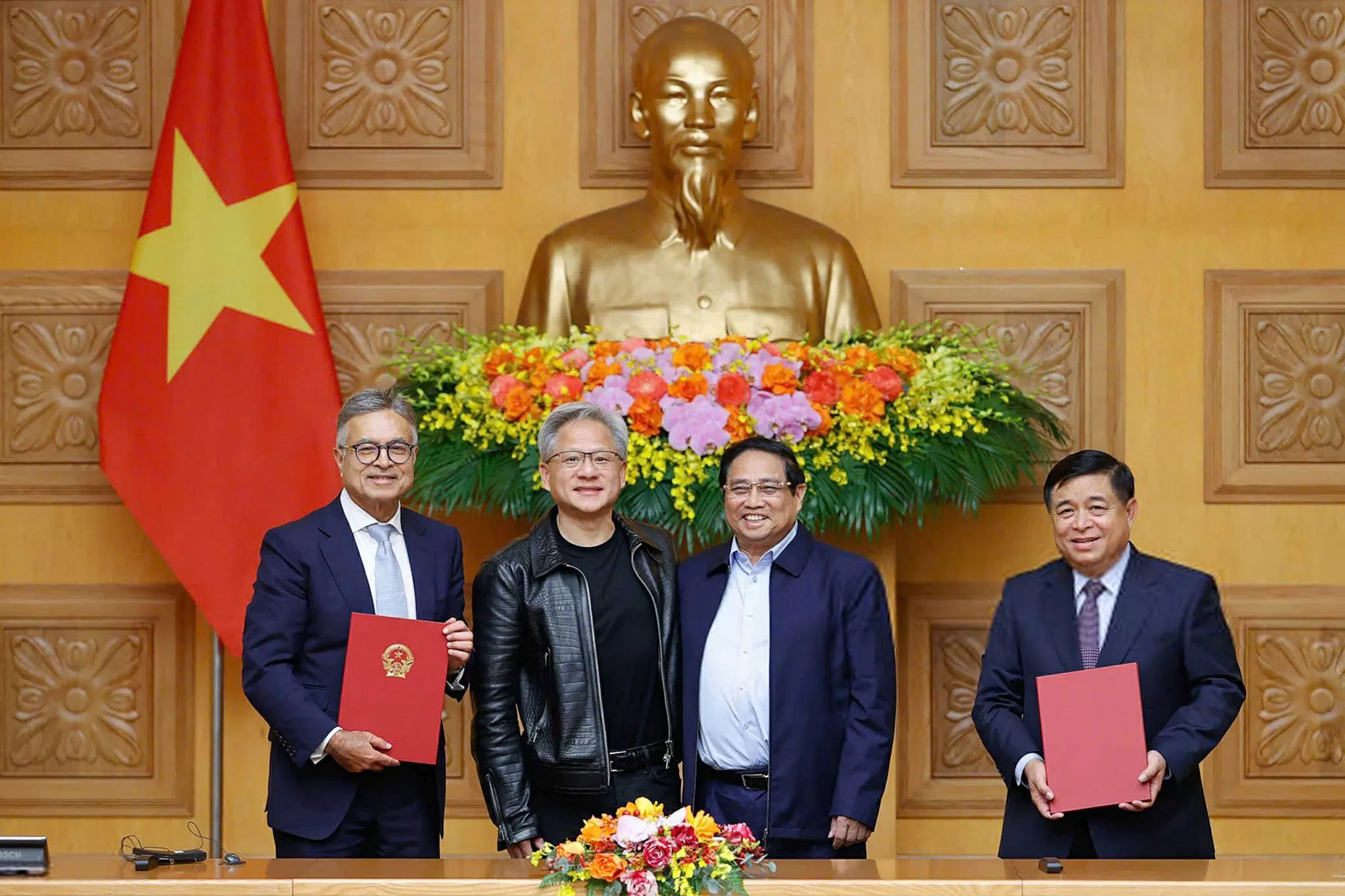 |
| Prime Minister Pham Minh Chinh and NVIDIA Chairman Jensen Huang witnessed the signing ceremony of an agreement between the Vietnamese Government and NVIDIA Corporation on cooperation in establishing NVIDIA's Artificial Intelligence (AI) Research and Development Center and AI Data Center in Vietnam, December 5, 2024. (Source: VGP) |
In the context of strong globalization, innovation, adaptation and active participation in the global technology ecosystem have become urgent requirements for every country, especially highly open economies like Vietnam. On that basis, Resolution 57 of the Politburo on breakthroughs in science, technology, innovation and national digital transformation; Resolution 71 of the Government on amending, supplementing and updating the Government's Action Program to implement Resolution 57; and the List of 11 strategic technologies and national strategic technology products have laid an important foundation for Vietnam to gradually implement a new foreign policy focus: Science and technology diplomacy.
Emerging technologies and strategic competition
The world is entering a new technological cycle that has the potential to reshape the geo -economic and geo-strategic order for decades to come. Fields such as AI, quantum, synthetic biology, neurotechnology, and autonomous robots not only promise to create revolutionary breakthroughs in productivity and innovation, but are also becoming the pillars of national power in the 21st century. Unlike previous waves of technology, the current cycle is highly interdisciplinary, has strong dual-use capabilities, and is spreading rapidly, creating both new opportunities and challenges for countries and global governance mechanisms.
Large-scale deep learning models could make AI a semi-automated tool in manufacturing, research, governance, and defense. Quantum technology, though still in its early stages, offers remarkable possibilities for computing, coding, and simulating physics and chemistry. In biology, gene editing and precision medicine are reshaping agriculture and healthcare, while brain-machine interfaces open up the possibility of deep integration between humans and smart devices. Underpinning all of this are semiconductors and robotics systems, providing the physical infrastructure for these technologies to operate efficiently and in sync.
However, technology is increasingly being “securitized”, especially in the strategic competition between major countries, especially between the US and China, when the focus gradually shifts from geopolitics to “geotechnology”. In addition to the US-China competition axis, the global technological order is shifting towards selective multipolarity: the EU promotes “digital sovereignty” and an ethical legal framework for new technologies; Japan combines AI with industrial reform and coping with an aging population; middle-class countries such as South Korea, Singapore, and Malaysia strive to position themselves as regional innovation hubs. Meanwhile, developing or middle-class countries in terms of technology face a difficult problem: both having their policy space narrowed by dual standards on data and platforms, and having the opportunity to choose a wise strategy to improve their position, if they have the right vision and focus.
In summary, emerging technologies are expected to profoundly change international relations, both in terms of global governance and national sovereignty, security and development. Participants are increasingly diverse and powerful, especially technology companies. Global and national governance mechanisms have not kept up with the pace of technological development. The trend of politicizing and securitizing technology in the vortex of strategic competition is increasing. Technology opens up many opportunities, but the digital divide is at risk of widening; the relationship between integration, digital connectivity and data sovereignty is increasingly complex.
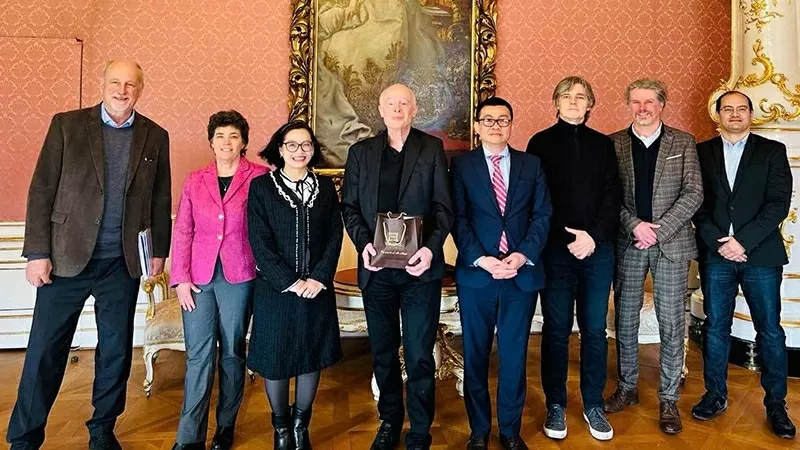 |
| Vietnamese Ambassador to the Republic of Austria Vu Le Thai Hoang visited and worked with the International Institute for Applied Systems Analysis (IIASA) based in Austria, February 14, 2025. (Source: Vietnamese Embassy in Austria) |
Important pillar in foreign strategy
Rapidly changing realities require agile adaptation, with new thinking and approaches that go beyond the conventional framework. Science and technology diplomacy is a new concept in Vietnam, but has become an important pillar in the foreign policy strategies of many countries with the mindset of building position through technological capabilities such as the UK, Denmark, Italy, South Korea, Singapore, India, etc.
This thinking stems from the fact that in the 21st century, national competition is no longer just in the military or economic-commercial fields, but increasingly revolves around the ability to dominate fundamental technologies: from AI, quantum, semiconductors to biotechnology and renewable energy. The pioneering country, leading in the development, application and dissemination of technology will play a key role in shaping standards, attracting high-tech manufacturing value chains and protecting strategic interests and national security in a volatile global environment.
In common understanding, technology diplomacy is the use of diplomatic tools - dialogue, negotiation, international cooperation - to promote domestic technology development and build international standards on science and technology. Technology diplomacy considers technology a focus of foreign policy, national security and economic development. The basic characteristics are multi-subject (between countries, international organizations, non-governmental organizations, enterprises, research institutes, universities, etc.), interdisciplinary, proactive, anticipatory; combining traditional and modern methods (such as Technology Ambassadors, Virtual Embassy, etc.), taking people as the center of science and technology development.
In general, pioneering countries implementing science and technology diplomacy often focus on three tasks: Researching and forecasting global technology trends; participating in shaping the “rules of the game”, standards and international governance institutions related to technology; and promoting international cooperation and integration in science and technology; connecting resources and expanding cooperation, creating both “soft power” and “hard power” for the country.
Holistic approach, harmonious combination
For Vietnam, the new wave of technology is not only a scientific and technological revolution, but also a turning point in development thinking and adjustment of strategic position. Resolution 57 and the National Strategic Technology List demonstrate a clearer awareness of the core role of technology in ensuring security, independence, sovereignty and prosperity in the 21st century. In that context, science and technology diplomacy needs to be systematically and systematically established as a form of "niche diplomacy", implemented proactively, creatively, and in accordance with Vietnam's capacity and advantages.
To make science and technology diplomacy a strategic focus of foreign policy, it is necessary to have a comprehensive approach, harmoniously combining improving internal capacity, establishing an interdisciplinary coordination ecosystem, and selectively expanding international cooperation, suitable to national conditions and interests.
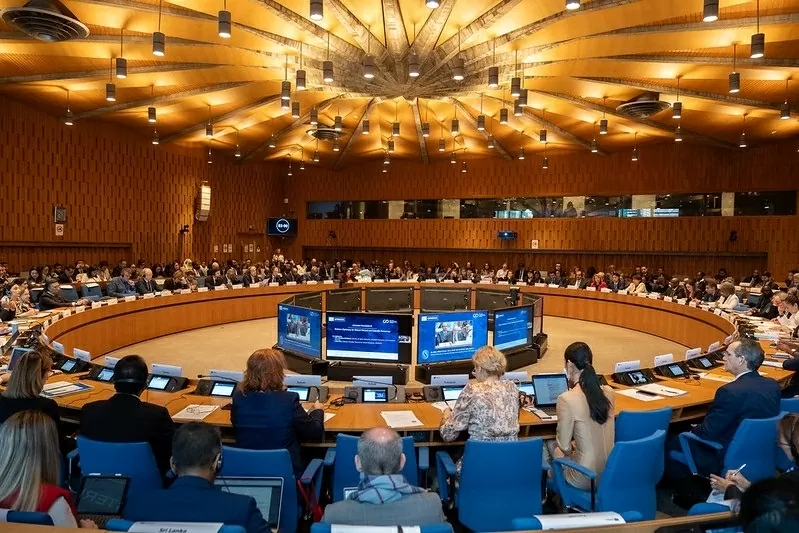 |
| The Vietnamese delegation attended the Science Diplomacy Ministerial Conference organized by UNESCO in Paris, France from March 25-26, 2025. (Source: mst.gov.vn) |
In terms of approach, it is necessary to consider science and technology diplomacy as a new way of operating foreign policy thinking, in which technology is a strategic component of national power and a factor shaping the structure of power and international institutions. International practice shows that this diplomacy places emerging technology at the center of foreign policy, security and economic development. Therefore, implementation must be closely linked to the socio-economic development strategy, national defense and security and national strategies on digital transformation, industrialization and innovation. The Ministry of Foreign Affairs and the network of 98 Vietnamese representative agencies abroad accompany ministries, branches, enterprises, research institutes and universities according to the "public - private - institute - school" model in connecting research, technology transfer and implementation.
In terms of focus, it is necessary to focus on five tasks: Researching and forecasting technology trends and their impact on international relations; learning from international, bilateral and multilateral experiences; participating in dialogues and negotiations to shape rules, standards and laws governing emerging technologies in multilateral diplomacy; enhancing international cooperation and integration in technology as a strategic priority, shifting from “inviting investment” to “strategic technology partnerships”, promoting and exporting Vietnamese technology; and connecting and attracting brainpower, resources and technology from the global network of overseas Vietnamese intellectuals.
Regarding human resources, it is necessary to have a strategy to develop a team of foreign affairs officers who are knowledgeable about technology, and technology experts who are capable of participating in international dialogues, policy making, and representing national interests at multilateral forums.
Faced with the pressure of global technological competition, science and technology diplomacy must be the strategic focus of Vietnam's modern foreign policy. This is not only a tool to support development, but also a method to protect and promote national interests in a rapidly changing environment. Effective implementation requires interdisciplinary thinking, close coordination between actors, and most importantly, identifying the right priorities and choosing the right fields that match the country's strengths and needs. If done, science and technology diplomacy will be an important lever to help Vietnam integrate more deeply and proactively into the emerging technological order.
Source: https://baoquocte.vn/ngoai-giao-khoa-hoc-cong-nghe-trong-ky-nguyen-moi-325746.html



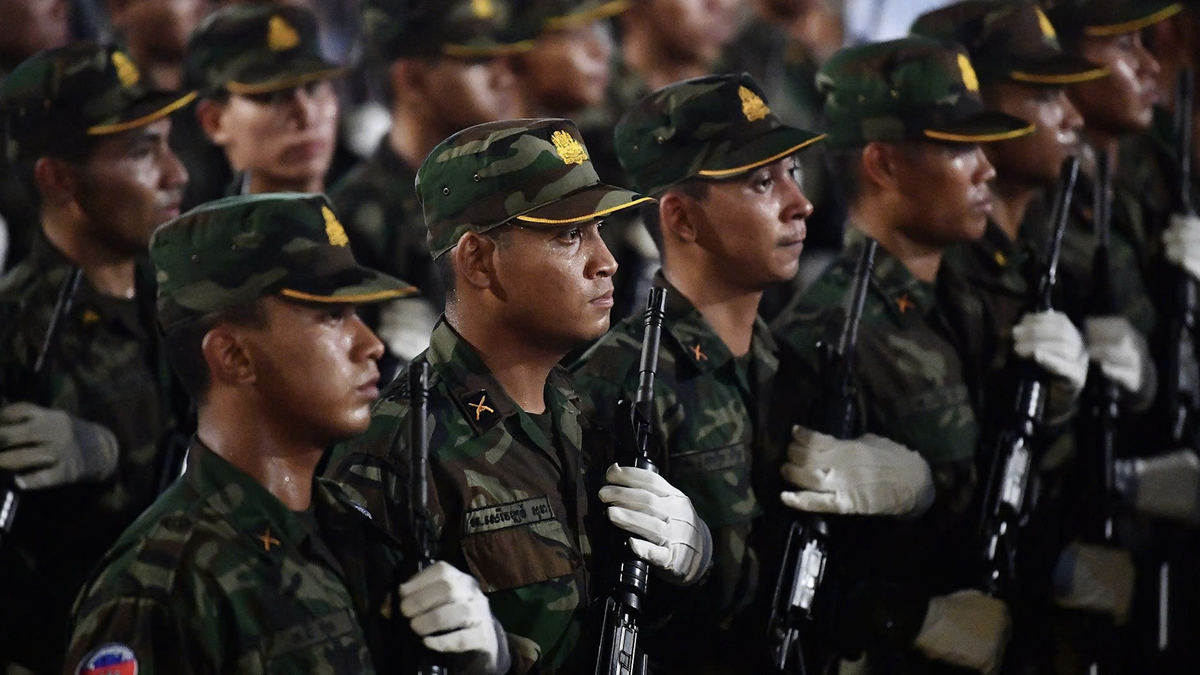

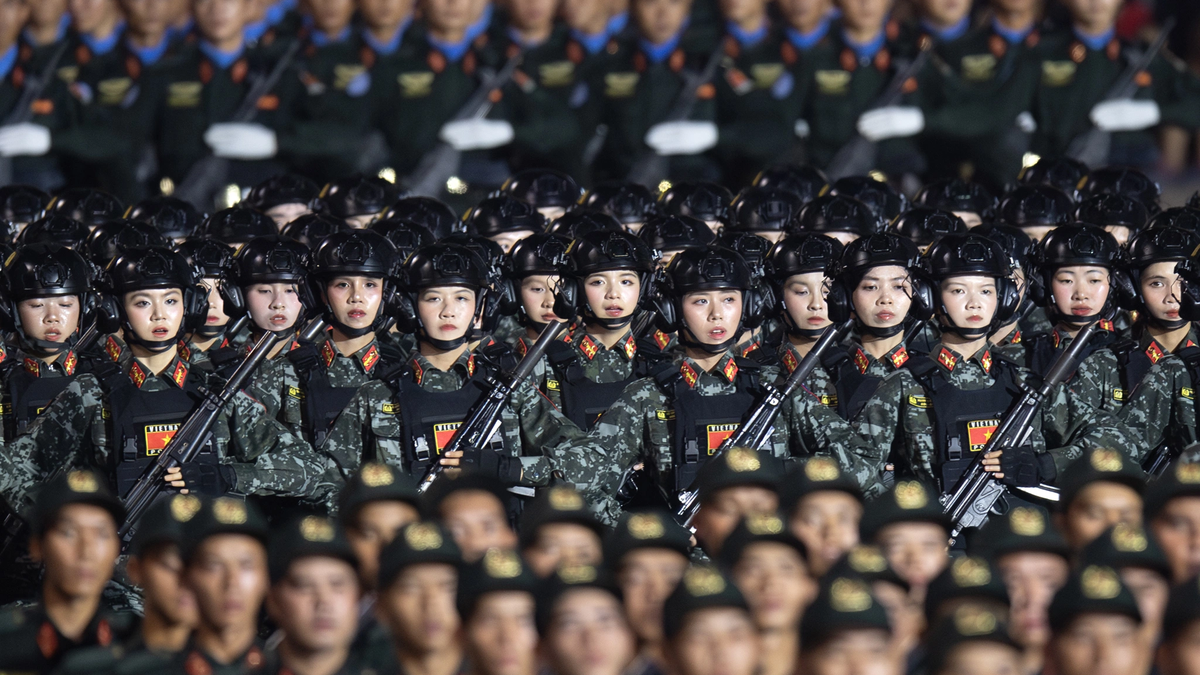
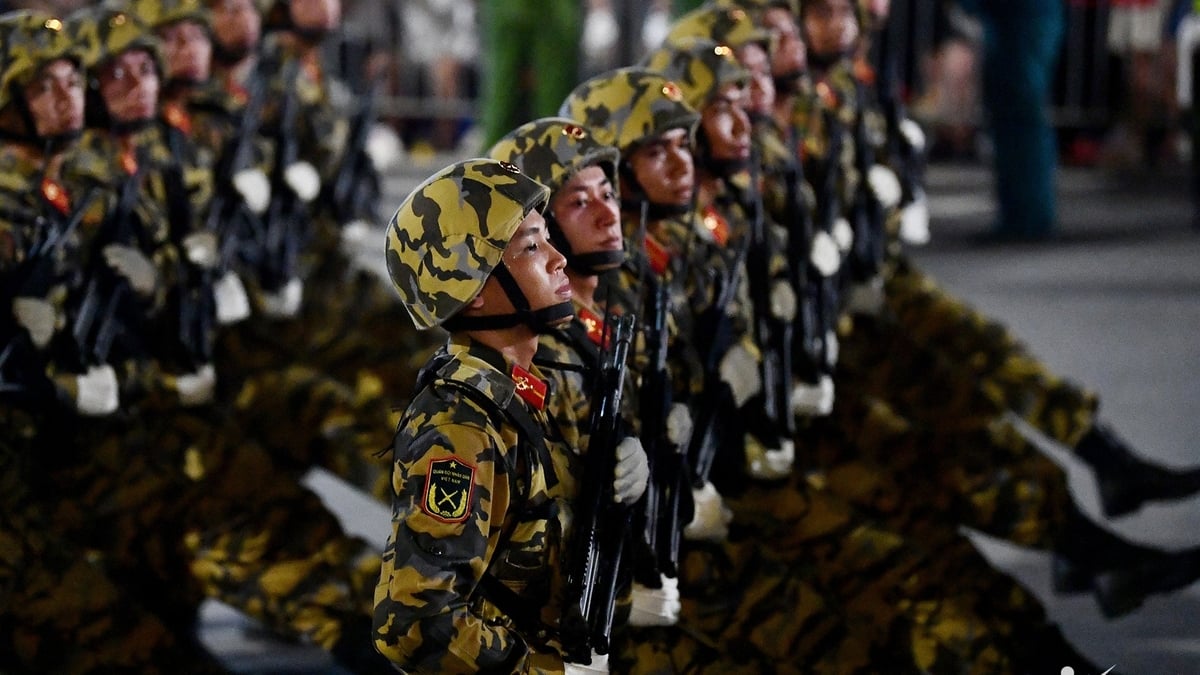
![[Photo] National Assembly Chairman Tran Thanh Man holds talks with New Zealand Parliament Chairman](https://vphoto.vietnam.vn/thumb/1200x675/vietnam/resource/IMAGE/2025/8/28/c90fcbe09a1d4a028b7623ae366b741d)
![[Photo] General Secretary To Lam attends the opening ceremony of the National Achievements Exhibition](https://vphoto.vietnam.vn/thumb/1200x675/vietnam/resource/IMAGE/2025/8/28/d371751d37634474bb3d91c6f701be7f)
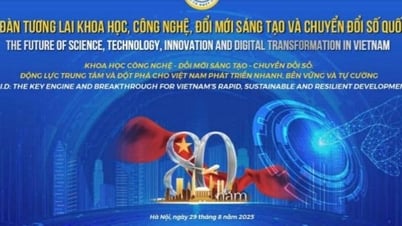



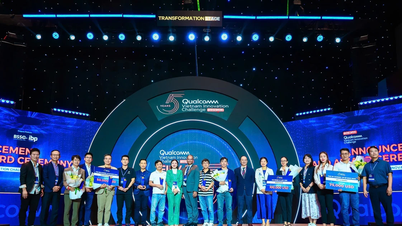

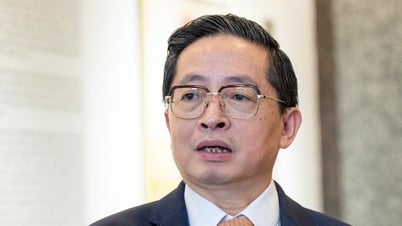

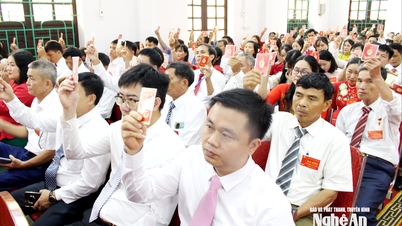

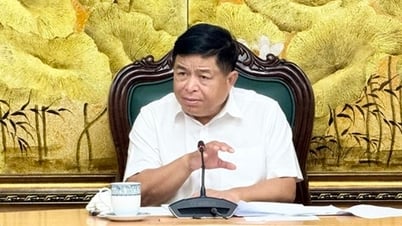
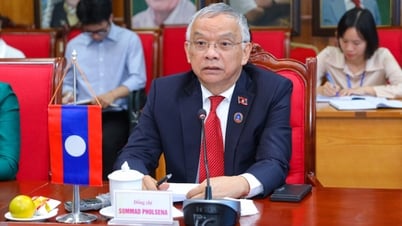

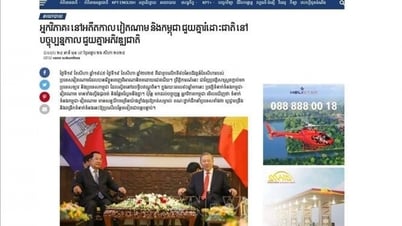
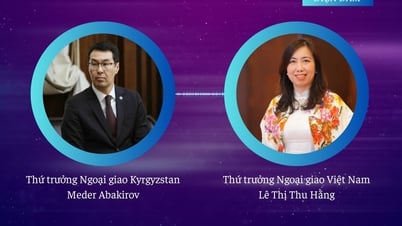
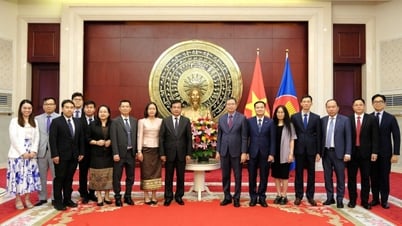
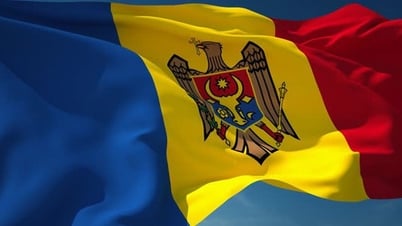

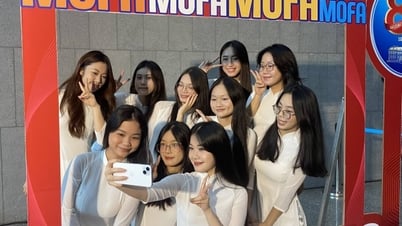




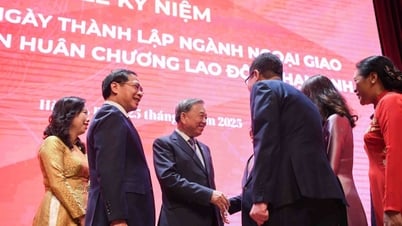

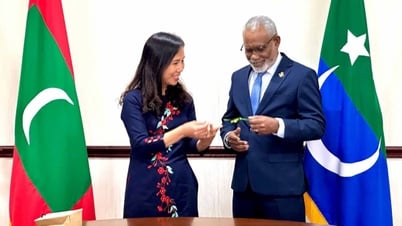
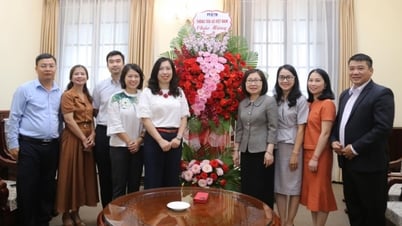
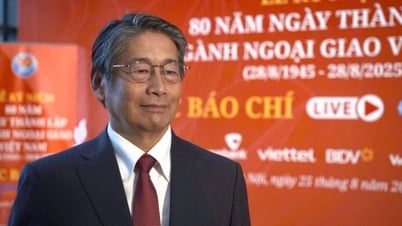
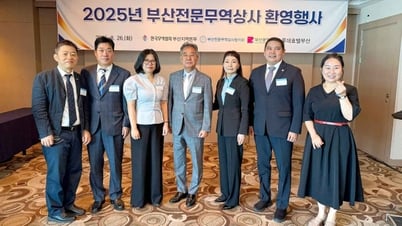
![[Photo] Images of the State-level preliminary rehearsal of the military parade at Ba Dinh Square](https://vphoto.vietnam.vn/thumb/1200x675/vietnam/resource/IMAGE/2025/8/27/807e4479c81f408ca16b916ba381b667)






















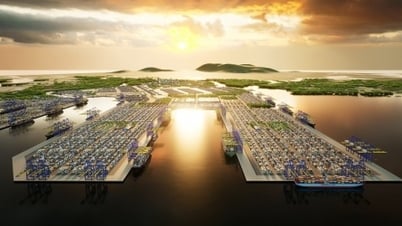
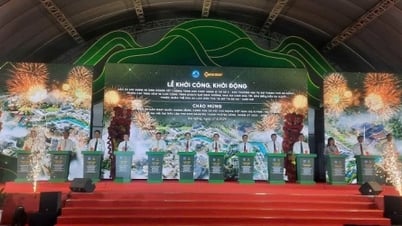















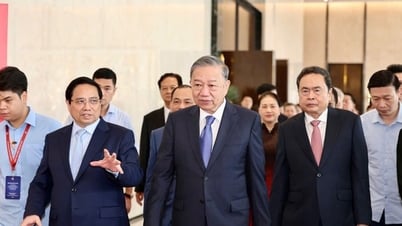
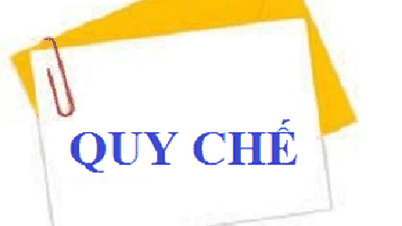
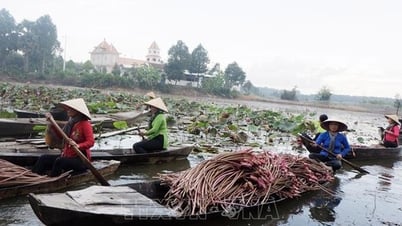
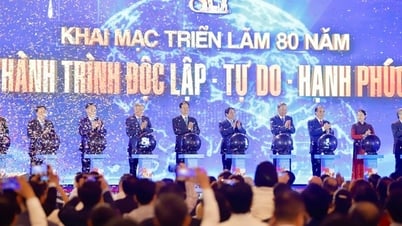
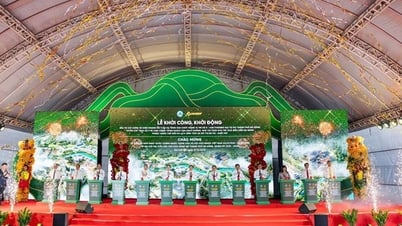
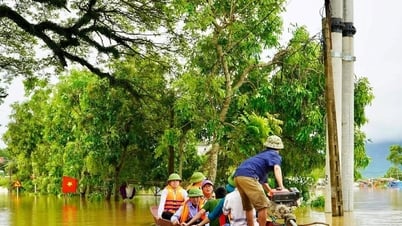




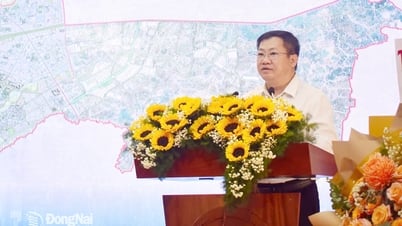




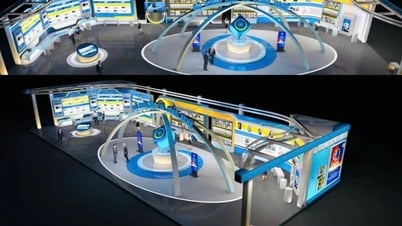










Comment (0)